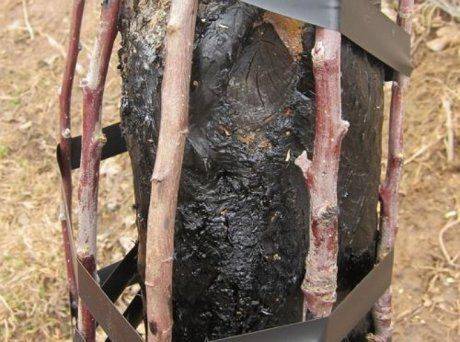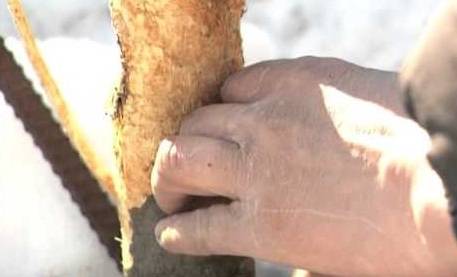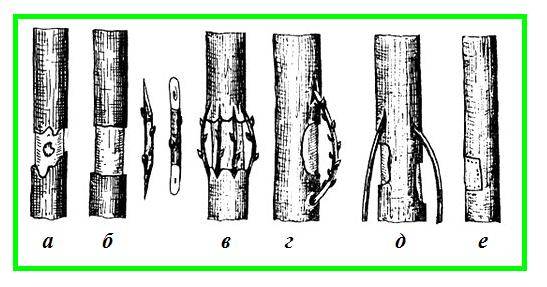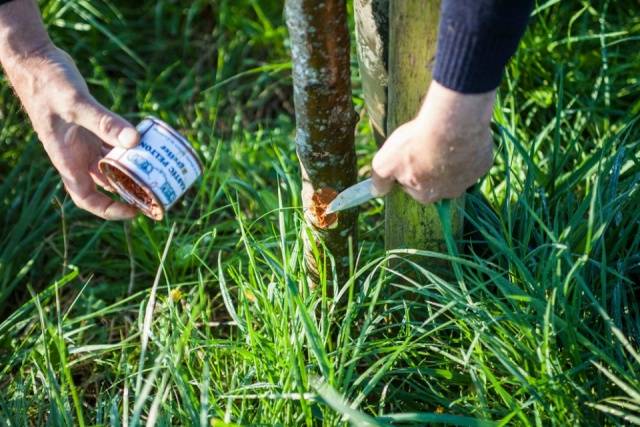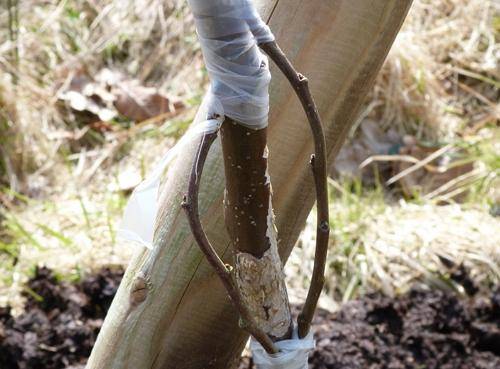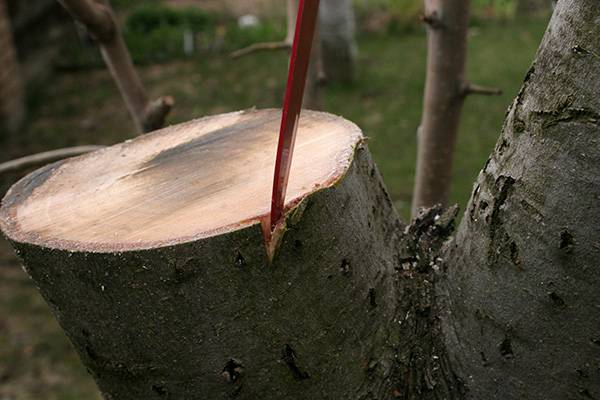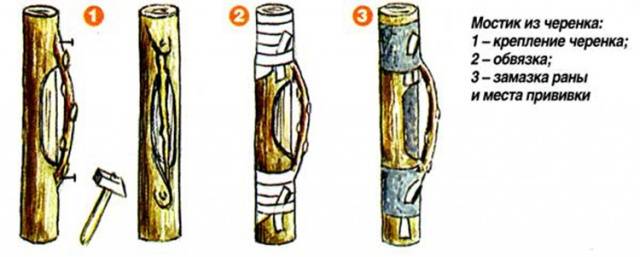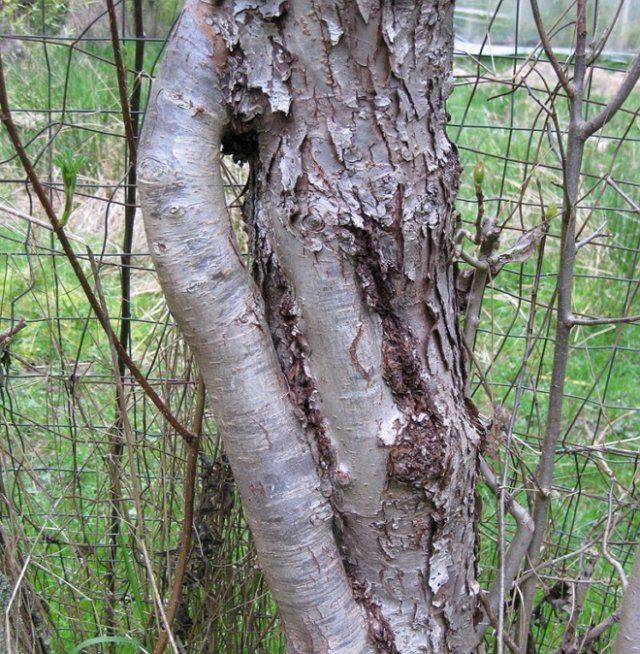Content
Many gardeners have apple trees on their plots. Often, for various reasons, you have to deal with their treatment. One option is vaccination. With the help of this operation, two parts of the trunk are combined into one whole. Inoculation with a bridge on an apple tree performed most often in the spring, while the plant has not yet woken up from wintering.
Indications for vaccination
The reasons for the vaccination can be different:
- Make an operation on one tree so that apples of different varieties grow on it, thereby saving space in the garden.
- To increase the frost resistance of the fruit tree.
- Prevent the damaged apple tree from dying.
- Growing short trees using a shallow rootstock.
In the article we will focus on the preservation of damaged apple trees, and the rules for grafting them with a bridge.
Preparatory work
Tools
Any vaccination is a serious procedure, during which you need to use special tools and materials. In particular, when pointing the bridge between the damaged parts of the barrel, use:
- grafting knife or secateurs;
- materials for tying the wound;
- garden var, putty or ordinary children's plasticine.
Before work, cutting tools need to be well sharpened so that sharp cuts are obtained, and there is no bark jam. A knife or pruner must be carefully processed to exclude pathogenic bacteria from entering the wound and cuttings. Alcohol is best suited for these purposes.
About bridging vaccination
Unlike other grafts, the bridge is not designed to produce new varieties of plants. Its main task is to restore the vital activity of the fruit tree after damage. The bark of apple trees can be damaged by rodents, scorching sun or severe frosts. An area appears on the tree that prevents the normal movement of the sap. It also needs to be restored.
It is necessary to plant apple trees with a bridge when the trunk is damaged along the entire circumference.
Vaccination materials
When carrying out vaccination with a bridge, you can use the following "surgical" materials:
- ordinary cuttings;
- live branches located below the injury;
- root shoots;
- pieces of bark.
The options for using the materials at hand are below in the picture.
To make it clear, let's decipher the notation:
- a) - damaged area;
- b) - cleaned up place of damage;
- c) - the use of cuttings;
- d) - a bridge from its own branch;
- e) - the use of root growth;
- f) - bark as a patch.
Correct cuttings
Experienced gardeners are engaged in harvesting cuttings in the fall after leaf fall or early in the spring, until the sap flow has begun. Repair material cut in April or May rarely takes root. Good cuttings should be as shown in the photo.
The repair material is stored in a cool place in wet sand or sawdust. It is necessary to ensure that the cuttings do not germinate ahead of time. Already during the preparation of the material, it is necessary to take into account the size of the cuttings: they must be long in order not only to cover the damaged area, but also to go behind it on each side of six centimeters.
You need to harvest cuttings of different lengths and thicknesses so that you can "darn" any damage.Before inoculation, the kidneys must be broken off, since they can disrupt the function of the bridge for grafting the apple tree if they start growing.
In case of minor damage, if the cambium is preserved, inoculation with a bridge is not carried out. The wound is treated with Bordeaux liquid and covered with garden pitch and the trunk is tightly wrapped in polyethylene. As a rule, the restored bark can be observed under the bandage in autumn.
When apple trees are grafted
Bridge grafting is suitable for many fruit trees. In this way, you can "repair" apple trees, pears, plums. Not every gardener is able to cope with the upcoming work, since the technology is quite complex and time consuming.
Terms of operation
It is impossible to name the exact time for the repair of fruit trees, since the climatic conditions of the regions vary greatly. You need to focus on snow melting and unhindered separation of the bark, as shown in the photo below.
Technology
If an annular damage to the bark is found, urgent measures must be taken to save the tree. To putty the damaged area, you can use garden varnish, putty, natural drying oil or oil paint. Such a procedure will prevent the apple tree from drying out and give it the opportunity to hold out until the juice begins to move.
Step-by-step instruction
- When intensive sap flow begins, the injured area is cleaned of putty, wiped with a clean cloth soaked in water.
- The edges of the damage are trimmed, for which a sharp disinfected knife is used. The wood must not be damaged!
- Prepared cuttings are kept in the room to keep them warm. All kidneys are removed from them. Both ends of the scion are cut at an acute angle. The length of oblique cuts should be at least 3-4 centimeters.
- T-shaped incisions are made on the bark from above and below from damage. Carefully fold back the edges and insert the handle under the bark. Moreover, the procedure begins from the lower edge of the wound.
- The inserted stalk must be wrapped tightly, then insert the other end into the upper notch. The location of the bridges for inoculation is strictly vertical and necessarily arched. This position ensures normal sap flow.
Features of fixing cuttings
When grafting cuttings with a bridge, special rules must be observed:
- When applying oblique cuts, you need to press them tightly against the apple tree wood so that the cambium match is maximized. The slightest gap causes rejection.
- The fixation of the ends of the cuttings during grafting with a bridge must be rigid. You can even nail them to the trunk with small studs and then tie them tightly.
- For tying it is best to use twine, PVC or plastic wrap, sponge tape. A tissue-based medical patch is also suitable.
- The grafting sites with a bridge are well coated with garden varnish, putty, plasticine so that dust does not get into them.
Vaccination care
In summer, shoots may appear at the site of grafting of cuttings of bridges. It must be removed without fail. The crown of the apple tree is also cut by a third to prevent the loss of moisture necessary for the engraftment of the bridge.
Often, young apple trees have to be grafted. They are still weak, they can break in the place of the bridge. To prevent this from happening, two stakes are driven in next to the fruit tree and the apple tree is tied to them.
Apple trees grafted with a bridge must be fed with phosphorus and potassium fertilizers and loosened the soil in the crown zone.
To understand the features of performing a bridge vaccination on an apple tree, watch the video:
What is the result of the vaccination
If the operation was successful, then it will become noticeable after two or three weeks. The rootstocks are thickening, which means that nutrients have begun to flow through the bridge. Shoots appear on the cuttings, which must be removed immediately. This is a signal that the harness needs to be loosened, or replaced with a new one.
As a rule, cuttings completely take root on grafting with a bridge in a month. At this time, the garter is removed. If you don't remove it, the apple tree will hurt.
You do not need to perform any more actions. The bridge will gradually thicken and become an excellent conductor of nutrients through the damaged area on the apple tree branch.
After a few years, the grafted bridge will become thick, as in the photo below.
Even experienced gardeners do not always succeed in grafting apple bridges. You can repeat the operation next season. If it was not possible to restore sap flow with the help of cuttings, it may be possible to do this with the help of the bark. The main thing is not to despair, but to find a way to preserve apple trees in the garden.
